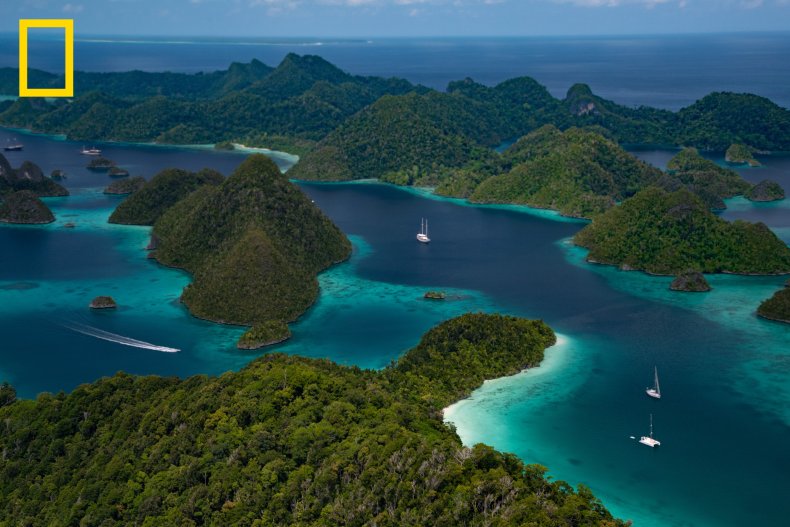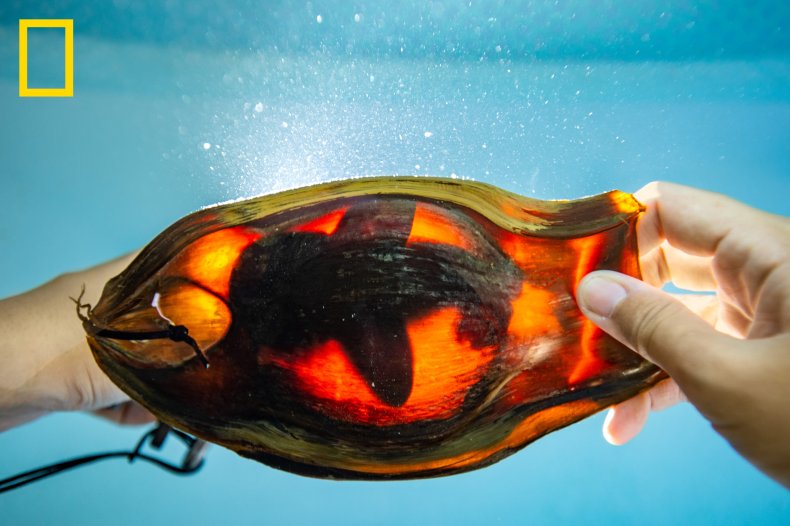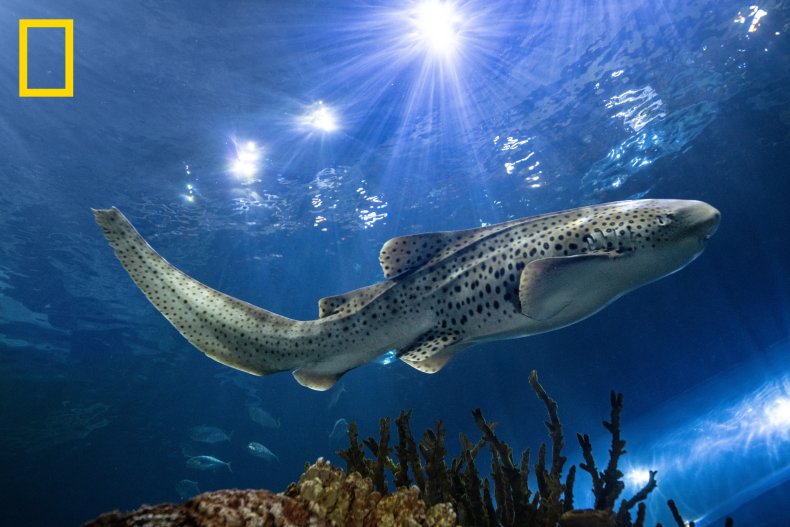See First Baby Shark of Hundreds Released in Bid To Save Endangered Species
Footage and photos capturing the first baby zebra sharks going into the wild as part of an ambitious reintroduction plan to restore populations of the endangered species have been released.
The video was captured by National Geographic underwater photographers David Doubilet and Jennifer Hayes, in Indonesia in January to witness the landmark event.
The reintroduction effort, run by the ReShark organization, hopes to release around 500 more zebra shark pups in Indonesian waters over the coming years.
ReShark is a growing international collective currently comprising more than 70 conservation organizations, aquariums, government agencies and other institutions from around the world. It aims to restore populations of threatened sharks and rays.
The collective's StAR Project aims specifically to restore zebra shark populations in the waters of Raja Ampat—a stunning archipelago located in West Papua, Indonesia.

Zebra sharks had all but disappeared in Raja Ampat as a result of habitat degradation and overfishing. Between 2001 and 2021, scientists only documented three zebra sharks in the area, National Geographic reported.
Zebra sharks are classified as an endangered species on the International Union for Conservation of Nature Red List. The species, which can grow to around 8 feet in length, is found in the tropical Pacific and Indian oceans. However, their populations are at risk of extinction everywhere outside of Australian waters.
The species is prized for its meat and is hunted and sold throughout the Philippines, Thailand, Indonesia and Malaysia. Its fins are also used to make soup, a delicacy in China.
They are an inshore shark, living over sand, rock reefs and coral bottoms. They hunt at night, generally feeding on mollusks, crustaceans and small bony fish.
Zebra sharks play a key role as predators in the ecosystems where they are found, helping to maintain the food web. As a result, ReShark says restoring populations of these sharks in areas where they have disappeared, such as Raja Ampat, will balance and improve the health of these marine ecosystems.
The waters of Raja Ampat were once dominated by fishing activities. However, it is now home to some of the world's most well-enforced marine protected areas.
These protection measures have contributed to significant recoveries in the populations of other shark species in the region. Zebra shark populations have not followed suit though, and they remain on the verge of extinction here.

Zebra sharks, like many other sharks, have a slow population growth rate. Research has shown that additional interventions on top of fishing regulations and the creation of protected areas will be required to restore their numbers.
This is where the StAR Project comes in, which is being led by the West Papua Provincial Government and the Research and Innovation Agency of Indonesia.
The project is the first major global effort to restore an endangered shark population. While numerous rewinding efforts have taken place on land across the world, no reintroduction of endangered sharks has taken place at this scale before.
The StAR Project involves releasing zebra shark pups in Raja Ampat that have been bred in aquariums around the world to create a self-sustaining population.
"ReShark is about action not words on paper," Doubilet and Hayes told Newsweek. "ReShark is putting endangered sharks back into the sea, where they belong, into places they will now be protected. And protection is key."

"Raja Ampat is the last stronghold of coral wilderness on our planet that is now protected through a network of community-based marine protected areas. We have worked in these waters where sharks had become ghosts in the sea, vanished from overfishing, but now the waters are patrolled and protected sharks released here can thrive instead of being fished out," they said.
In January, ReShark released two baby zebra sharks—siblings known as Charlie and Kathlyn—in a protected area of Raja Ampat. Another pup, Audrey, was released at a later date.
Footage captured by the photographers shows 15-week-old Charlie being released and later exploring the tropical waters of his new home. Charlie developed as an egg at an aquarium in Australia and was later flown to Indonesia, where he hatched in a new shark nursery.

"Charlie, the first shark released off one of the most remote islands on the planet, had quite an audience—dignitaries, government officials, scientists, shark nannies, NGOs and their senior board members, including the celebrated actor Harrison Ford and his family," the photographers said.
"But the shining stars of the day were sharks Charlie and Kathlyn—and the most important attendees were the local community who invest in the day-to-day oversight of the marine protected area."
Marine species reintroduction efforts are fraught with potential problems, and it remains to be seen whether or not the project will be successful. Even so, scientists are hopeful that the reintroduction has a chance of meetings its goals, not least because shark fishing is banned in the area where Charlie and Kathlyn now live. Thankfully, zebra sharks are also good at adapting to captivity—a fact that is beneficial for captive breeding programs.
"We took away solid, not just wistful, hope for sharks," the photographers said. "It was a good day for zebra sharks, and we hope to submerge into Wayag lagoon in the future and meet Charlie, Kathlyn, or Audrey again—or better yet, their offspring."
The project also has potential to serve as a model for the reintroduction of other shark species around the world—something that ReShark is assessing.
"The best part of ReShark is its potential—it started with zebra sharks, but it does not end there," the photographers said. "There is a growing list of shark species in partner aquariums that can be released into their future in the sea."
"Aquariums have been at the center of conversations and not all conversations have been good, but ReShark is an example of where aquariums are critical to restoring endangered species in the wild. In many cases, aquariums know the biology, behavior, and genetics of a species better than any entity and they are key to successful rewilding."
For more on this story, visit: Natgeo.com/rewildingsharks

